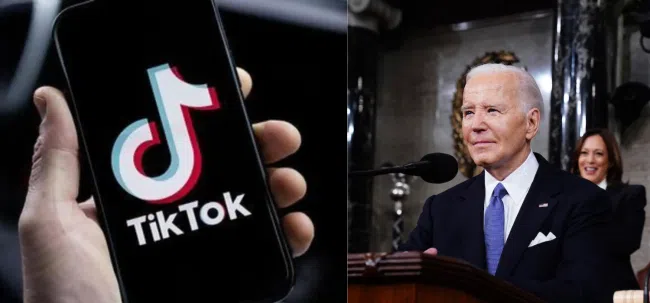One report from TikTok claims that laws “would trample the free speech rights of 170 million Americans.”
The well-known video-sharing software TikTok would be prohibited from operating until it separated from its Chinese parent business, according to legislation that was adopted by the US Senate.
President Joe Biden, who has supported the provisions, can now sign the bill into law after it was approved on Tuesday. However, it is anticipated that the legislation will face legal challenges.
Included in a bigger $95 billion plan that gives foreign aid to Israel and Ukraine, the idea would give the Chinese business ByteDance nine months to sell the platform.
In order to speed up the package’s passage through Congress, Republicans in the House of Representatives last week added the TikTok bill to the foreign aid measures. This led to a 79–18 Senate vote in favor of the package.
By a bipartisan vote of 360 to 58, the House approved the measure on Saturday.
TikTok is a platform that Beijing might use to sway public opinion and spy on Americans, according to claims made by both Republicans and Democrats, endangering national security.
TikTok has maintained that it has not and will never give the Chinese authorities access to user data from American users.
The contentious program that permits the monitoring of US individuals’ communications without a court order was reauthorized by the US Congress a few days prior to the vote.
Sunday, TikTok released a statement claiming that the bill requiring its sales “would trample the free speech rights of 170 million Americans.”
In the event that the law is challenged as unconstitutional, TikTok is anticipated to request a preliminary injunction to stop its implementation.
Similar legislation was stopped by a judge in the US state of Montana last year after it was determined that it “oversteps state power” and “likely violates the First Amendment.”
Proposals have also been met with opposition on the grounds of free speech by civil liberties organizations, such as the American Civil Liberties Union and The Knight First Amendment Institute at Columbia University.
A similar bill that would have forced TikTok to sell was passed by the House last month, but it was stalled in the Senate.
An executive order banning TikTok was signed by then-President Donald Trump in 2020, but the decision was overturned in court on the grounds that it infringed on the rights to free speech and due process.







